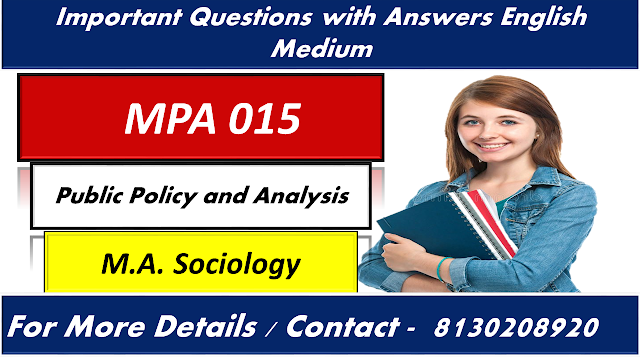IGNOU MPA 015 Important Questions With Answers English Medium
IGNOU MPA 015 Public Policy and Analysis is a course offered
by the Indira Gandhi National Open University (IGNOU) as part of its Master of
Arts (Public Administration) (MPA) program.
Course
Structure:
- Unit 1: Introduction to Public Policy Analysis
- Unit 2: Policy ProcTechniques ess and Analysis Frameworks
- Unit 3: Research Methods for Policy Analysis
- Unit 4: Evaluation for Public Policy
Q.1
Explain the 'concept of policy' and discuss the various types of public policies.
The concept of policy is a multifaceted and essential aspect of governance and public administration, encompassing deliberate systems or courses of action designed to guide decision-making and achieve specific objectives within a given context. Public policies, in particular, refer to actions, regulations, and strategies formulated by governments to address societal issues, enhance public welfare, and regulate various aspects of public life.
IGNOU MPA 015 Important Questions With Answers English Medium-Serving as a framework for decision-makers, these policies navigate
complex challenges, allocate resources efficiently, and shape the overall
direction of a society. The diverse array of public policies reflects the
intricacies of modern governance, tailored to address specific concerns and
priorities across sectors such as healthcare, education, economic development,
and environmental sustainability.
Also Read-
- IGNOU MPA 013 Important Questions With Answers English Medium
- IGNOU MPA 014 Important Questions With Answers English Medium
- IGNOU MPA 011 Important Questions With Answers English Medium
Public policies can be categorized into distinct types based on their focus and intended outcomes, with an approximate list of types capturing the breadth of their impact on societal governance. Economic policies, for instance, include fiscal policies that manage taxation and government spending to influence economic stability and growth.
IGNOU MPA 015 Important Questions With Answers English Medium-Monetary policies, on the other hand, involve regulating money
supply and interest rates to control inflation and stabilize the economy. In
the realm of social policies, healthcare policies dictate the provision of
medical services and accessibility, ensuring the well-being of citizens.
Similarly, education policies shape the structure and content of educational
systems to foster a knowledgeable and skilled populace.
Environmental policies address concerns related to natural resources, pollution, and conservation, aiming to create a sustainable balance between human activities and the environment. Infrastructure policies focus on developing and maintaining public utilities, such as transportation and communication networks, shaping the physical and technological foundations of a society.
Housing policies tackle accommodation, affordability, and urban
planning issues, aiming to provide suitable living conditions for all citizens.
Criminal justice policies govern law enforcement, legal procedures, and
corrections, influencing the maintenance of public order and the administration
of justice.
Labor and employment policies regulate the relationship between employers and employees, covering issues like minimum wage, working hours, and occupational safety. Social welfare policies, including social security and welfare programs, provide a safety net for vulnerable populations, ensuring a basic standard of living.
IGNOU MPA 015 Important Questions With Answers English Medium-Trade and foreign policy guide a nation's
interactions with other countries, influencing economic relations, diplomacy, and
international cooperation. Defense and security policies focus on safeguarding
a nation's interests through military strategies, intelligence, and national
security measures.
Beyond these categories, specific policies address issues such as science and technology, energy, cultural affairs, and telecommunications. Science and technology policies guide research and innovation, shaping the trajectory of technological advancements. Energy policies manage the production, distribution, and consumption of energy resources, balancing economic needs with environmental sustainability.
Cultural
policies aim to preserve and promote cultural heritage, creativity, and
diversity within a society. Telecommunications policies regulate communication
networks and services, ensuring accessibility and fair competition in the
digital age.
Furthermore, agricultural policies govern the cultivation, distribution, and trade of agricultural products, influencing food security and rural development. Regional and urban development policies target disparities between regions, fostering balanced growth and alleviating regional inequalities.
IGNOU MPA 015 Important Questions With Answers English Medium-Immigration policies shape the entry, residence, and integration
of foreign nationals, reflecting a nation's approach to demographic challenges and
cultural diversity. Lastly, innovation and entrepreneurship policies focus on
creating an environment conducive to business development, job creation, and
economic dynamism.
Q.2
Explain systems model for Policy Analysis and highlight its utility in policy process.
Q.3
Discuss the nature, scope and utility of policy services.
Q.4
'Prime Minister's office plays a substantive role in policy making'. Examine and elucidate.
Q.5
Bring out the role of International Agencies in policy making
Q.6
Examine the major problems in Policy Implementation.
Q.7
Discuss the nature, significance and criteria for policy evaluation.
Q.8
Define policy analysis and discuss its process.
Q.9
What do you understand by Computer Simulation ? Explain its applications in
public policy process.
Q.10
Write note on 'Decisions under Risk'.
Q.11
Discuss the nature and typologies of public policy
Q.12
Explain the significance and types of policy impact.
Q.13
Examine the impact of telecom policy on telecom sector
Q.14
Explain the horizontal and vertical linkages in policy-making.
Q.15
Analyse the role of civil society organisations in policy-making with suitable
examples.







0 comments:
Note: Only a member of this blog may post a comment.